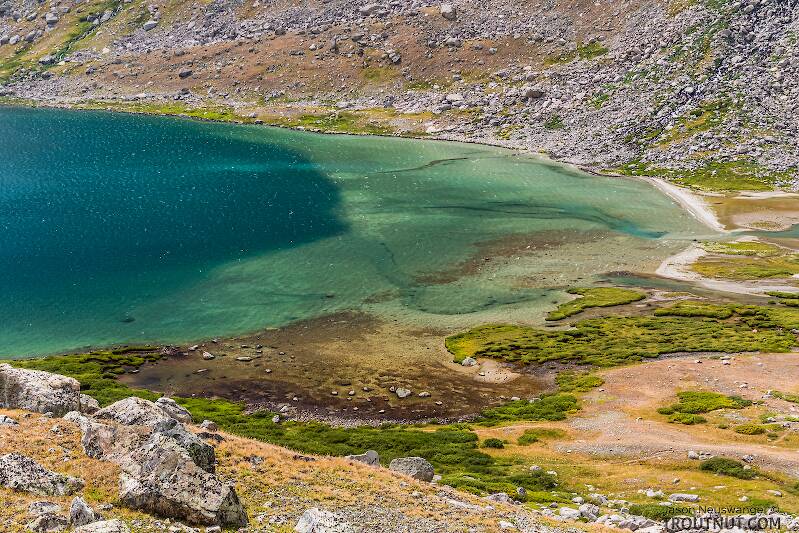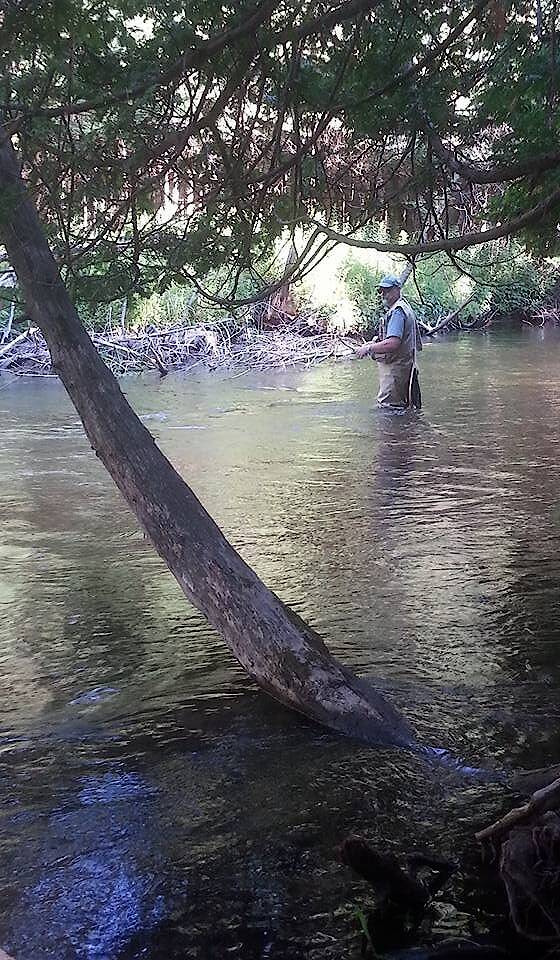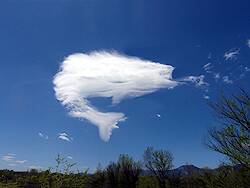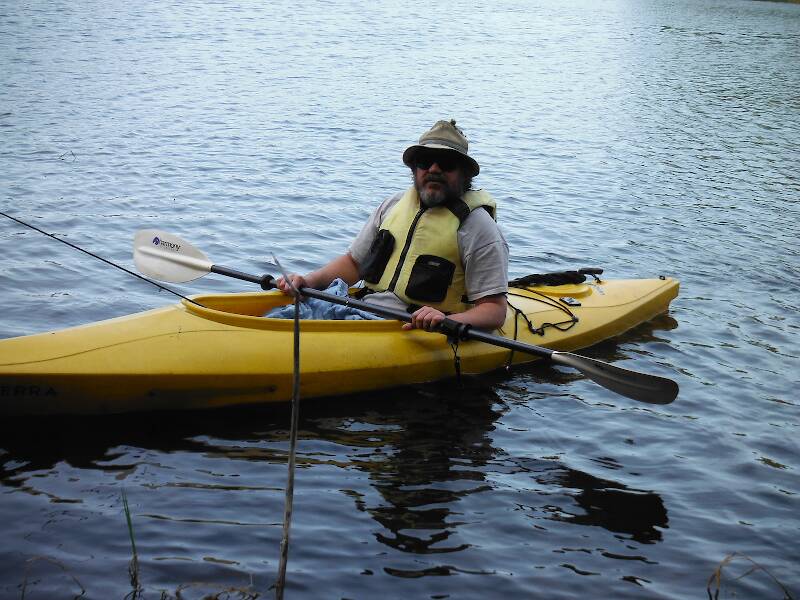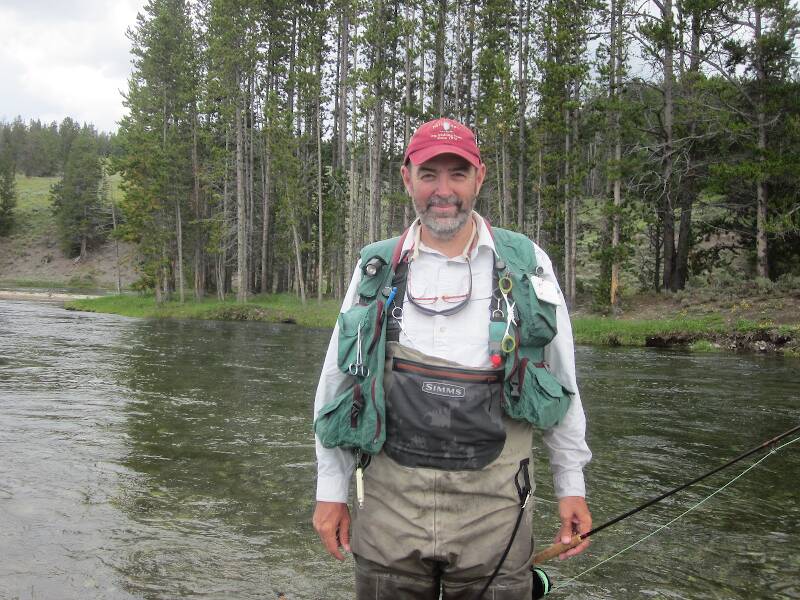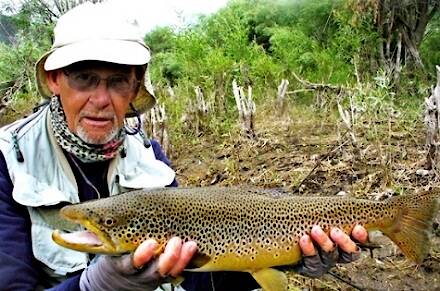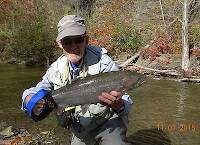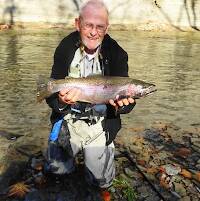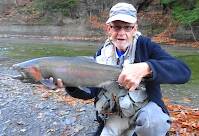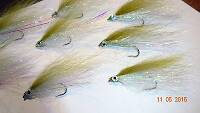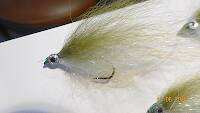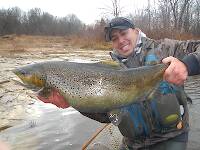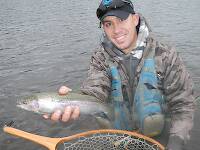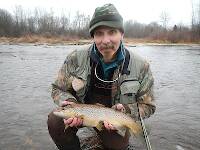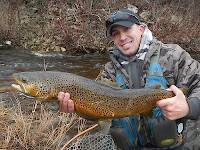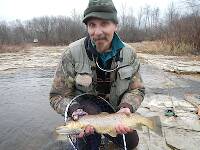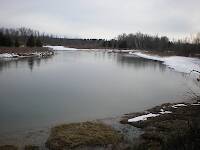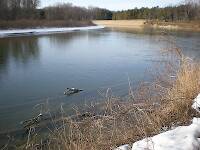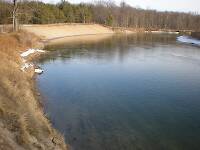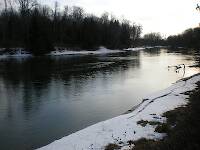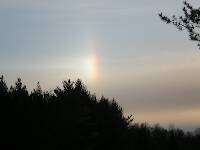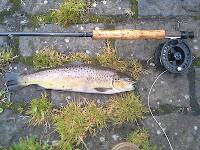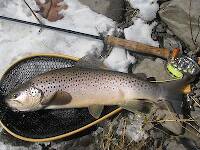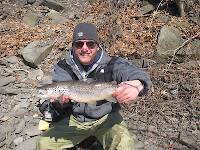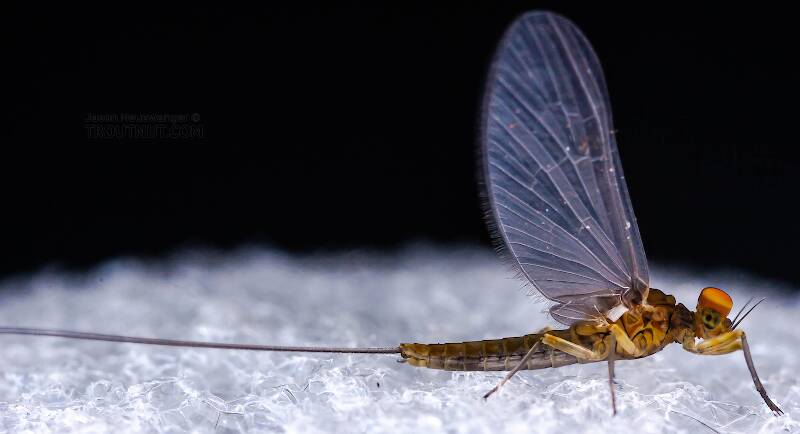
Blue-winged Olives
Baetis
Tiny Baetis mayflies are perhaps the most commonly encountered and imitated by anglers on all American trout streams due to their great abundance, widespread distribution, and trout-friendly emergence habits.
Featured on the forum
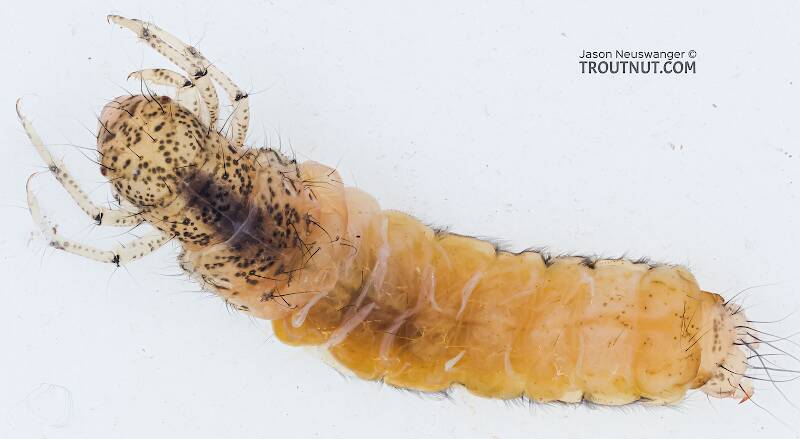
This is a striking caddis larva with an interesting color pattern on the head. Here are some characteristics I was able to see under the microscope, but could not easily expose for a picture:
- The prosternal horn is present.
- The mandible is clearly toothed, not formed into a uniform scraper blade.
- The seems to be only 2 major setae on the ventral edge of the hind femur.
- Chloride epithelia seem to be absent from the dorsal side of any abdominal segments.
Based on these characteristics and the ones more easily visible from the pictures, this seems to be Grammotaulius. The key's description of the case is spot-on: "Case cylindrical, made of longitudinally arranged sedge or similar leaves," as is the description of the markings on the head, "Dorsum of head light brownish yellow with numerous discrete, small, dark spots." The spot pattern on the head is a very good match to figure 19.312 of Merritt R.W., Cummins, K.W., and Berg, M.B. (2019). The species ID is based on Grammotaulius betteni being the only species of this genus known in Washington state.
- The prosternal horn is present.
- The mandible is clearly toothed, not formed into a uniform scraper blade.
- The seems to be only 2 major setae on the ventral edge of the hind femur.
- Chloride epithelia seem to be absent from the dorsal side of any abdominal segments.
Based on these characteristics and the ones more easily visible from the pictures, this seems to be Grammotaulius. The key's description of the case is spot-on: "Case cylindrical, made of longitudinally arranged sedge or similar leaves," as is the description of the markings on the head, "Dorsum of head light brownish yellow with numerous discrete, small, dark spots." The spot pattern on the head is a very good match to figure 19.312 of Merritt R.W., Cummins, K.W., and Berg, M.B. (2019). The species ID is based on Grammotaulius betteni being the only species of this genus known in Washington state.

Troutnut is a project started in 2003 by salmonid ecologist Jason "Troutnut" Neuswanger to help anglers and
fly tyers unabashedly embrace the entomological side of the sport. Learn more about Troutnut or
support the project for an enhanced experience here.
Roguerat on Jan 2, 2017January 2nd, 2017, 1:09 pm EST
I watched a steelhead being caught today and it was rainbow trout colored- full on green and black with a nice pink stripe. I've seen other steelies that were truly 'chrome' fish and looked as if they'd been dipped in a plating tank. I've heard that the longer a steelhead is in a river the more it begins to resemble a rainbow, and I'm wondering if these are spawning colors or what.
Anyway, it was a beautiful fish and massive compared to the stream-born rainbows I usually catch in this particular stream which are considered big at 12-14".
Roguerat
'Less is more...'
Ludwig Mies Vande Rohe
Anyway, it was a beautiful fish and massive compared to the stream-born rainbows I usually catch in this particular stream which are considered big at 12-14".
Roguerat
'Less is more...'
Ludwig Mies Vande Rohe
RleeP on Jan 3, 2017January 3rd, 2017, 12:25 am EST
I think in Great Lakes "steelhead", you could be seeing a number of things...
Even though some of the state agencies have concentrated on specific strains as either "starter" fish (where wild fish are the norm) or continuing fingerling/smolts augmentation of the existing fishery, the Great Lakes steelhead fishery is a hodgepodge of different strains and crosses between them. This could account for some of the coloration differences.
And then, as you note, the time period that the fish has been out of the lake and in the stream also can have an effect on appearance as could the fish's internal spawning clock. This latter can show up just about any time
in some of the GL steelhead fisheries given that some percentage of the fish present are descended from hatchery-reared catchable rainbows that have had their spawning clocks messed with in order to make them spawn at the same time as browns and brook trout.
Even though some of the state agencies have concentrated on specific strains as either "starter" fish (where wild fish are the norm) or continuing fingerling/smolts augmentation of the existing fishery, the Great Lakes steelhead fishery is a hodgepodge of different strains and crosses between them. This could account for some of the coloration differences.
And then, as you note, the time period that the fish has been out of the lake and in the stream also can have an effect on appearance as could the fish's internal spawning clock. This latter can show up just about any time
in some of the GL steelhead fisheries given that some percentage of the fish present are descended from hatchery-reared catchable rainbows that have had their spawning clocks messed with in order to make them spawn at the same time as browns and brook trout.
PaulRoberts on Jan 3, 2017January 3rd, 2017, 1:23 am EST
Ditto RleeP. When I fished Lake O and its tribs there were three main runs:
-A fall run of "steelhead" (saltwater ancestry) (mostly in the larger rivers) that entered according to genetic programming mostly, some of whom would winter over in the river or in the estuary. They spawn in spring.
-A fall run of "domestic" (hatchery) rainbows that would spawn before full ice-up.
-The spring spawning runs consisted of SW ancestry steelhead, and one of domestics that would spawn in spring.
All would enter the rivers dressed in "pelagic silver", turn what I called "metallic" (gradually gaining rainbow trout spawning coloration) but with a highly reflective metallic hue. Upon full spawning dress (when eggs were to be laid) the colors intensify and the overall coloration goes non-reflective, which may simply heighten nuptial colors in shallow water. Post-spawn they re-gain reflectivity as they shift from spawning on specific shallow sites to migration mode as they drop back to the lake. Winter hold-overs tend to remain metallic (in semi-migratory mode.)
Some fish, esp domestics, may "color-up" in the lake proper. And some of these fish will spawn on the lake front, outside small natal creek mouths if the water remains too low for entry.
It's been some years (decades) now so I don't know how things have shaken out since. Genetics... drift.
-A fall run of "steelhead" (saltwater ancestry) (mostly in the larger rivers) that entered according to genetic programming mostly, some of whom would winter over in the river or in the estuary. They spawn in spring.
-A fall run of "domestic" (hatchery) rainbows that would spawn before full ice-up.
-The spring spawning runs consisted of SW ancestry steelhead, and one of domestics that would spawn in spring.
All would enter the rivers dressed in "pelagic silver", turn what I called "metallic" (gradually gaining rainbow trout spawning coloration) but with a highly reflective metallic hue. Upon full spawning dress (when eggs were to be laid) the colors intensify and the overall coloration goes non-reflective, which may simply heighten nuptial colors in shallow water. Post-spawn they re-gain reflectivity as they shift from spawning on specific shallow sites to migration mode as they drop back to the lake. Winter hold-overs tend to remain metallic (in semi-migratory mode.)
Some fish, esp domestics, may "color-up" in the lake proper. And some of these fish will spawn on the lake front, outside small natal creek mouths if the water remains too low for entry.
It's been some years (decades) now so I don't know how things have shaken out since. Genetics... drift.
Jmd123 on Jan 3, 2017January 3rd, 2017, 2:52 am EST
Another complicating factor is that steelhead were actually "accidentally" introduced into the Great Lakes in the mistaken belief that the first egg shipments were stream-resident rainbows. These fish supposedly disappeared for a couple of years then suddenly showed up much larger! So, you have well over 100 years of wild steelhead successfully spawning in at least SOME streams, continuing to this day (like the Rifle and the Pine in my area), which is supplementing the hatchery fish AND have evolved for that time period STRICTLY in the Great Lakes.
Hmmm, sounds like a Doctoral Dissertation in steelhead genetics is just waiting out there for someone...too bad I'm too old for that, and I'm on the other side of the desk now anyway - which starts again on the 16th!
If I can get someone in a boat to take me, I might have to hit the Au Sable which is almost in my backyard but not terribly wadeable.
Tight lines and keep warm!
Jonathon
Hmmm, sounds like a Doctoral Dissertation in steelhead genetics is just waiting out there for someone...too bad I'm too old for that, and I'm on the other side of the desk now anyway - which starts again on the 16th!
If I can get someone in a boat to take me, I might have to hit the Au Sable which is almost in my backyard but not terribly wadeable.
Tight lines and keep warm!
Jonathon
No matter how big the one you just caught is, there's always a bigger one out there somewhere...
Roguerat on Jan 3, 2017January 3rd, 2017, 2:58 am EST
Gentlemen-
GREAT input on this query, and its sharpened my curiosity (as always) on how the MI DNR has managed and manipulated steelhead over the years. This is well worth Googling and I intend to as soon as I post this! Supposedly most- or all- of current Great Lakes region steelies are direct descendants of fish harvested in the Little Manistee River, the ancestors of which were in turn transplants from the NW Pacific coast. At least that's what I've read...
Roguerat
GREAT input on this query, and its sharpened my curiosity (as always) on how the MI DNR has managed and manipulated steelhead over the years. This is well worth Googling and I intend to as soon as I post this! Supposedly most- or all- of current Great Lakes region steelies are direct descendants of fish harvested in the Little Manistee River, the ancestors of which were in turn transplants from the NW Pacific coast. At least that's what I've read...
Roguerat
RleeP on Jan 3, 2017January 3rd, 2017, 3:05 am EST
That's a good point, Jonathon...
Long before the current Chamber of Commerce-fueled circus came into being on PA's Lake Erie tribs, there was a small dedicated cadre of guys who would fish the smallest of the direct tribs to the Lake (to Paul's point about small natal creeks...) for the trickle of what were in those days called "Lake Runs". Some (perhaps most) of these fish were swim downs from
the adult catchable RT stocked in a few of the larger tribs back then, but at least some of them were probably fish that could trace their lineage back to the original fish that Jonathon mentions. I think Bergman talked about this in Trout and specifically about the fishery in the Soo Rapids.
Long before the current Chamber of Commerce-fueled circus came into being on PA's Lake Erie tribs, there was a small dedicated cadre of guys who would fish the smallest of the direct tribs to the Lake (to Paul's point about small natal creeks...) for the trickle of what were in those days called "Lake Runs". Some (perhaps most) of these fish were swim downs from
the adult catchable RT stocked in a few of the larger tribs back then, but at least some of them were probably fish that could trace their lineage back to the original fish that Jonathon mentions. I think Bergman talked about this in Trout and specifically about the fishery in the Soo Rapids.
PaulRoberts on Jan 3, 2017January 3rd, 2017, 4:23 am EST
The history, or "pre-history", of stocking in this country is an amazing, and only partially told story, much of it lost to the archives. I used to own some of that archive in the old NYS Forest Commission reports dating back to the late 19th century, a time when "game laws" were first being enacted. The debates over wildlife populations and their uses, and habitat and watershed quality is a truly fascinating one. We owe what we have today from the results of these efforts. We are TRULY blessed here.
As to fish, the stocking records from those reports show that nearly everything was tried out. Cutts, rainbow, browns, brookies, salmon were tried virtually anywhere and everywhere. Fishery science has come a LONG way since. And, since transportation was overland by rail, accidents did happen and, at times, fish at risk of dying en route were simply liberated at rail-side.
There is quite a bit known about rainbow plantings, much archived, and certainly much lost. The Finger Lakes in NY has an interesting and known history going back over 100 years in which "California Redside Trout" were collected and sent East. Apparently, the early managers did not realize that migratory "steelhead" were mixed in with those resident Redsides, and today's "FL Rainbow" is decidely steelhead like in both looks, fighting qualities, and life history.
Then there are "ghost runs", GL's and coastal, that include 'bows, brookies and browns (some truly giant) that appear, mirror-bright, in "odd" places, well up GL and coastal tribs. Old timers on Lake O talked of a rainbow run that predates any known modern planting efforts. "They've always been in there", they would say.
Then there have been genetic manipulations of stocks (purposeful and accidental) and photoperiod manipulations (both purposeful and accidental) resulting in some odd runs. Apparently, the fall run domestics somehow stemmed from the latter. (And there were even some summer-run browns -big ones- that were the result of a photoperiod manipulation by hatchery staff -told to me by one of those managers.)
It's a story of monkeys just doing their thing -excitedly trying to figure stuff out- and 100-plus years of it.
Google away, there's plenty out there. But the depth and complexity of that story is archived in virtually every state of the union.
As to fish, the stocking records from those reports show that nearly everything was tried out. Cutts, rainbow, browns, brookies, salmon were tried virtually anywhere and everywhere. Fishery science has come a LONG way since. And, since transportation was overland by rail, accidents did happen and, at times, fish at risk of dying en route were simply liberated at rail-side.
There is quite a bit known about rainbow plantings, much archived, and certainly much lost. The Finger Lakes in NY has an interesting and known history going back over 100 years in which "California Redside Trout" were collected and sent East. Apparently, the early managers did not realize that migratory "steelhead" were mixed in with those resident Redsides, and today's "FL Rainbow" is decidely steelhead like in both looks, fighting qualities, and life history.
Then there are "ghost runs", GL's and coastal, that include 'bows, brookies and browns (some truly giant) that appear, mirror-bright, in "odd" places, well up GL and coastal tribs. Old timers on Lake O talked of a rainbow run that predates any known modern planting efforts. "They've always been in there", they would say.
Then there have been genetic manipulations of stocks (purposeful and accidental) and photoperiod manipulations (both purposeful and accidental) resulting in some odd runs. Apparently, the fall run domestics somehow stemmed from the latter. (And there were even some summer-run browns -big ones- that were the result of a photoperiod manipulation by hatchery staff -told to me by one of those managers.)
It's a story of monkeys just doing their thing -excitedly trying to figure stuff out- and 100-plus years of it.
Google away, there's plenty out there. But the depth and complexity of that story is archived in virtually every state of the union.
Jmd123 on Jan 3, 2017January 3rd, 2017, 5:01 am EST
I do think the Au Sable was also included in those early plantings here in MI. Without dams the whole river drainage would be a steelheader's paradise, but the only spawning habitat they have right now is the lower 10 miles of river. Given there are some nice extensive gravel beds on which they can spawn, but summer temps in the river go up to around 75 F or so. Let me put it this way: I can snorkel in it for two hours and STILL not get very cold, certainly nothing close to teeth-chattering (unlike the feeder creek at [REDACTED] Pond which is ice cold in August). So there can't be much survival, at least I've almost never seen parr while I'm snorkeling.
Now there IS one little tributary which is actually marked as Type I Designated Trout Stream on the maps (closed right now until the end of April). It looks completely natural and feeds out a natural lake, unlike the creek at Three Pipes which is nice and cold but has no gravel and no depth...too bad for the fish that get stuck up in there, but then again, Mr. Black Bear eats well after his long winter's nap! Anyway, I can get there if I kayak upstream, and I will make a point of doing that this summer. I need to explore new territory, but dang it, I've got so many productive spots right now (like 8 or 9...but it's all about the timing) and keeping up on them is nuts at certain times of the year. And then there's those days when you go somewhere and the fishing is not exciting and you think "shoulda gone THERE instead"...
Spoke with my boss at Affiliated earlier today and he does indeed have a craft suitable for steelhead drift fishing! We have agreed to coordinate on the milder days and I am under orders to tie more steelhead flies. Might as well, not going skiing or ice fishing anytime soon...
Jonathon
Now there IS one little tributary which is actually marked as Type I Designated Trout Stream on the maps (closed right now until the end of April). It looks completely natural and feeds out a natural lake, unlike the creek at Three Pipes which is nice and cold but has no gravel and no depth...too bad for the fish that get stuck up in there, but then again, Mr. Black Bear eats well after his long winter's nap! Anyway, I can get there if I kayak upstream, and I will make a point of doing that this summer. I need to explore new territory, but dang it, I've got so many productive spots right now (like 8 or 9...but it's all about the timing) and keeping up on them is nuts at certain times of the year. And then there's those days when you go somewhere and the fishing is not exciting and you think "shoulda gone THERE instead"...
Spoke with my boss at Affiliated earlier today and he does indeed have a craft suitable for steelhead drift fishing! We have agreed to coordinate on the milder days and I am under orders to tie more steelhead flies. Might as well, not going skiing or ice fishing anytime soon...
Jonathon
No matter how big the one you just caught is, there's always a bigger one out there somewhere...
Roguerat on Jan 3, 2017January 3rd, 2017, 5:24 am EST
maybe a tangent on the steelhead topic but Jonathon's comment on dams and access upriver sparked my memory.
The Boardman river has been slated for successive dam removals (one already, if I recall- the Brown Bridge dam) and this is not without opposition. The main concern is migratory fish going all the way upstream to spawn and possibly (inevitably, to some) upsetting an existing fishery for Brook and Brown trout due to habitat degradation from the larger fishes' redds along with competition for food. Is this a viable argument?
Passin' time on a sloppy afternoon...
Roguerat
The Boardman river has been slated for successive dam removals (one already, if I recall- the Brown Bridge dam) and this is not without opposition. The main concern is migratory fish going all the way upstream to spawn and possibly (inevitably, to some) upsetting an existing fishery for Brook and Brown trout due to habitat degradation from the larger fishes' redds along with competition for food. Is this a viable argument?
Passin' time on a sloppy afternoon...
Roguerat
RleeP on Jan 3, 2017January 3rd, 2017, 5:45 am EST
>>The Boardman river has been slated for successive dam removals (one already, if I recall- the Brown Bridge dam) and this is not without opposition. The main concern is migratory fish going all the way upstream to spawn and possibly (inevitably, to some) upsetting an existing fishery for Brook and Brown trout due to habitat degradation from the larger fishes' redds along with competition for food. Is this a viable argument?>>
I think it is a viable argument, and on the Boardman in specific, the only counter argument I think has any value would be if it could be demonstrated that the current dams on the river are damaging thermal regimes to the point that the resident fishery is being suppressed. Otherwise, it has always been my view (based admittedly on pretty limited experience..) that there are too many high quality Michigan trout streams that are to an extent, functionally ruined by the massive runs of anadromous fish from the Lakes. Three from the UP alone (IMO) are the Chocolay, Carp (at Marquette) and the Black (Between Brevort and Naubinway). All are so loaded with salmon and steelhead smolts that they are unpleasant to fish for resident trout.
I've spent a little time on the Upper Boardman and would hate to see the same thing happen to it. It's too fine a river for that...
I think it is a viable argument, and on the Boardman in specific, the only counter argument I think has any value would be if it could be demonstrated that the current dams on the river are damaging thermal regimes to the point that the resident fishery is being suppressed. Otherwise, it has always been my view (based admittedly on pretty limited experience..) that there are too many high quality Michigan trout streams that are to an extent, functionally ruined by the massive runs of anadromous fish from the Lakes. Three from the UP alone (IMO) are the Chocolay, Carp (at Marquette) and the Black (Between Brevort and Naubinway). All are so loaded with salmon and steelhead smolts that they are unpleasant to fish for resident trout.
I've spent a little time on the Upper Boardman and would hate to see the same thing happen to it. It's too fine a river for that...
PaulRoberts on Jan 3, 2017January 3rd, 2017, 9:18 am EST
Could be. Many of the Finger Lakes tribs in NY are 90+% smolts. But not all. Some, if long enough and with good brown habitat, the browns and resident bows do well.
Oldredbarn on Jan 4, 2017January 4th, 2017, 12:11 pm EST
The Boardman river has been slated for successive dam removals (one already, if I recall- the Brown Bridge dam) and this is not without opposition. The main concern is migratory fish going all the way upstream to spawn and possibly (inevitably, to some) upsetting an existing fishery for Brook and Brown trout due to habitat degradation from the larger fishes' redds along with competition for food. Is this a viable argument?
Rogue...I remember some studies done back in the 90's I think concerning the effects of the anadromous fish on the resident, year-round populations of Brown trout and Brook...In the PM.
I'm not sure if I saved anything, but maybe that would help your Google search...I remember one author claiming that the effect on the Brown's was substantial. He claimed, at the time, that there were more Brown trout in a stream I fished as a child in the 60's than there were actually in the PM.
The stream near my grandmothers property was very narrow. A trib compared to the mighty PM. I actually crossed in on downed logs during deer season...It ran through a five mile square swamp and some of these fish seldom saw any fishing pressure after the higher water around opening day.
Chasing deer back there as a kid during my first hunting season was a hoot and I learned a great lesson...Yes, their brains maybe small, but in their environment they have some good cards up their sleeves...If deer have sleeves. :) They ran me and my uncle around that swamp like chumps!
Big old swamp bucks that seldom left the cover...If we had actually had any luck back there, I don't know how we would of dragged them out to the road.
The history of fish transplants, as Paul suggests, goes back to a time where consequences weren't always considered. There is a great doc on Nat Geo lately called "Alpine"...It takes place in the Alps in Europe and there is an interesting segment about a strain of trout native to a lake there.
During the First World War starving soldiers dynamited it and ate the fish. These days American Rainbow and Brook trout swim there? What an odd circle, don't you think? We took Browns from Germany and the Lochs of Scotland, and now there are non-natives swimming in the Alps.
As you know here in Michigan the Alewives have crashed, some say due to invasive species crowding food sources, and it seems that the King Salmon experiment may be coming to an end...They are hitching their future hopes on Atlantic salmon.
Some of these imports were brought here originally after huge bait fish die-offs back in the late 50's and early 60's coated beautiful Michigan beaches with stinky fish. I lived in Norfolk VA at the time, but I remember visits to my uncles orchard near Bear Lake. He would take us out to the break walls near Manistee and Frankfort and we would drag home wash basins full of perch. I remember him talking of the fish die-offs and not totally understanding what was going on.
On some odd level I have difficulties at times with the "artificial" feel to things. I like to approach nature and wildness as naturally as possible, both with my fishing, and birding. Only to find at nearly every turn that at some point its been manipulated. I think we need this wild side somehow. I do anyway...
It's a convoluted trail out there, buddy...Good luck! Don't get lost, and share with us what you run into, from time to time. I think its important somehow. Your observations are important.
Spence
"Even when my best efforts fail it's a satisfying challenge, and that, after all, is the essence of fly fishing." -Chauncy Lively
"Envy not the man who lives beside the river, but the man the river flows through." Joseph T Heywood
"Envy not the man who lives beside the river, but the man the river flows through." Joseph T Heywood
Oldredbarn on Jan 4, 2017January 4th, 2017, 12:23 pm EST
One more quick thing...Think of the upper stretches of the Au Sable...There is a long tradition there of flies only and no-kill water and the storied fly fishing tradition up there. Big fish bring big problems and we have been spoiled up there with this so-called "wild" trout area...It may not be spoken of out loud, but dam removal bringing big fish upstream to the old trout lodges and expensive cabins on the river is a nightmare to folks living there. Folks tramping about, craping on their property. Dropping empty beer cans and beer cases, and bait containers around, and miles of mono and lures stuck in the trees, sets them upright in a cold sweat in the middle of their sleep.
They only see some of this during the Brown Drake and Hex madness. After that the riff-raff generally leaves the stream. And the happy fantasy returns...4 weight cane rods, tweeds, upstream dry flies, and a crisp bourbon or scotch in front of the Fall fireplace. :)
Spence
They only see some of this during the Brown Drake and Hex madness. After that the riff-raff generally leaves the stream. And the happy fantasy returns...4 weight cane rods, tweeds, upstream dry flies, and a crisp bourbon or scotch in front of the Fall fireplace. :)
Spence
"Even when my best efforts fail it's a satisfying challenge, and that, after all, is the essence of fly fishing." -Chauncy Lively
"Envy not the man who lives beside the river, but the man the river flows through." Joseph T Heywood
"Envy not the man who lives beside the river, but the man the river flows through." Joseph T Heywood
Wbranch on Jan 4, 2017January 4th, 2017, 2:34 pm EST
As Jonathon stated some "steelhead" are actually resident Great Lakes rainbows that were present before the first true Pacific steelhead were ever planted. Additionally as others have likely said the longer a chrome is in the creeks then more likely it is that the rainbow coloration will return. Also as the season goes into November I have caught steelhead that were on the ugly side. Pretty much very blackish grey with muted red stripes. I'll post up some color phases in the Photo forum. It's easier than trying to upload them to Photobucket first.
Catskill fly fisher for fifty-five years.
Strmanglr on Apr 21, 2017April 21st, 2017, 5:30 am EDT
< />
No, I don't always fly fish, sorry. Was w a friend who doesn't fly fish.
I saw a great many fish this year, haven't seen them like that in about 5-6 years.
Where I'm at fishing they usually look like above. Caught a fresher one...
< />
I always thought it was the nutrient change that gave em the color.
Really looking forward to the Grand R getting rid of it's dams, one down last year, many to go. I was fishing a trib of the Grand and wonder if the one dam taken out made a difference on fish count this year.

No, I don't always fly fish, sorry. Was w a friend who doesn't fly fish.
I saw a great many fish this year, haven't seen them like that in about 5-6 years.
Where I'm at fishing they usually look like above. Caught a fresher one...
< />

I always thought it was the nutrient change that gave em the color.
Really looking forward to the Grand R getting rid of it's dams, one down last year, many to go. I was fishing a trib of the Grand and wonder if the one dam taken out made a difference on fish count this year.
Quick Reply
Related Discussions
Topic
Replies
Last Reply
Re: 15 Pound Steelhead (Trout) caught in Bosnia (Slideshow & Videos included)
In Fishing Reports by IvansFishin
In Fishing Reports by IvansFishin
4
Jan 27, 2017
by IvansFishin
by IvansFishin
7
Mar 1, 2011
by Pryal74
by Pryal74

